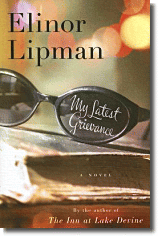 Ronlyn Domingue
Ronlyn Domingue's debut novel
The Mercy of Thin Air recently caught my attention.
The book has grabbed
considerable praise, including this gem from bestselling author Jodi Picoult: "This is that rarest of first novels--a truly original voice, and a truly original story."
Read a synopsis of
The Mercy of Thin Air here.
I asked the author to apply the "
page 69 test" to her novel. Here's her reply:
Mr. McLuhan’s page 69 theory sent me into a panic. Forget book jackets and blurbs. Does a book allow a glimpse at its soul on that page? I grabbed some favorite titles from my shelves: The Ogre, To Kill a Mockingbird, Winter’s Tale, Catfish and Mandala. In my opinion, they all passed the test. Oh no.
I fanned through my novel. Ah, well, page 69 is the first page of Part Two. Not a bad place to start. I read the paragraphs, paused, and decided I’d read my own book after all.
The excerpt reveals several recurring elements in The Mercy of Thin Air. (Frankly, I was surprised.) On this page alone, the reader finds a character’s refusal to deal with the past, unusual manifestations of the senses, intimacy and sexuality, and subtle observations of human interaction.
Who knew one little old page could divulge so much?
Set in 1920s New Orleans and present-day Louisiana, The Mercy of Thin Air is about Raziela Nolan, who is in the throes of a magnificent love affair when she dies in a tragic accident. In an instant, she leaves behind her one true love and her dream of becoming a doctor--but somehow, she still remains. Immediately after her death, Razi chooses to stay between--a realm that exists after life and before whatever lies beyond it. Seventy-five years later, in this ghost-like state, Razi takes residence with a troubled couple whose history mirrors her own. Her intervention in their lives forces her to face the truth of what happened to her beloved Andrew and the nature of her very existence.
I often say that my novel is part love story, part “ghost” story, and part exploration of our fragile human lives and memories. Thoughtful readers who’ve shared their comments tend to agree. Although, I have to say, they’ve found more layers in this book that I ever intended or imagined. What gifts they have given me. . .
From The Mercy of Thin Air, page 69
Amy didn’t watch the rest of the DVD Chloe had sent her, but I did. There were only a few minutes left. The footage was taken at a party. People waved at the camera and talked to Chloe, the voice behind the lens. The microphone hummed with music and chatter. The shot moved through a dining room next to a narrow kitchen doorway. On the wall behind Amy was a calendar, August 1992. She hugged the dark-haired young man, and he clearly didn’t want them to be interrupted. They shared a strangely intimate moment for such a celebratory atmosphere. He was talking, but his voice did not come through. I strained through the noise and read his lips--It’ll be okay, he said. We’ll have the whole drive up. Sex in at least one strange bed. He nudged her, and she smiled. Thanksgiving will be here before you know it. This is only temporary.
For several days after she hid the disc, the essence of another man billowed intermittently throughout the house. More often, she snapped her head toward doorways and furniture corners with no discernable reason why. Amy was not reacting to me, I knew: there was another reason for her jitters.
Within that time, Amy stopped watching Scott as he slept before she left for work. Then one morning, and another, and each one after, she didn’t kiss him goodbye. The only habit she kept was to keep him warm.
(c) Ronlyn Domingue, 2005
Many thanks to Ronlyn for the input.
The publisher offers a couple of excerpts--
here and
here--that grabbed my interest along with the author's comments above; I'll definitely move this novel up on my "to read" list.
Meg Wolitzer reviewed The Mercy of Thin Air for the
Washington Post:
Character itself is the focus of Ronlyn Domingue's The Mercy of Thin Air, which, like Alice Sebold's The Lovely Bones, employs a dead narrator to comment on the activities of the living. But Domingue's Razi Nolan is a more stylized creature than Sebold's murdered Susie Salmon....
Because this is essentially a ghost story, Domingue loads up on atmosphere. She also provides an original and compelling plotline about certain clandestine all-female parties held in the 1920s at which young women are educated about contraception and sexual awareness: "Diaphragms are similar to pessaries but have a spring hinge that folds so they can be properly placed. They are not yet readily available here. You must be fitted by a doctor and taught to use them. If you haven't married yet, get a fake wedding ring. Most doctors won't tell you a thing if you don't have a husband."
Blending the practical matters of marriage with the sentimental, Domingue has fashioned an emotionally satisfying story of love and longing.
For more
reviews, click here.
There are a number of print and audio interviews with Ronlyn Domingue available
here.
Previous "page 69 tests":
Shari Caudron, Who Are You People?Marisha Pessl, Special Topics in Calamity PhysicsJohn Sutherland, How to Read a NovelSteven Miles, Oath BetrayedAlan Brown, Audrey Hepburn's NeckRichard Dawkins, The Ancestor's Tale--Marshal Zeringue
of 35: Flaubert had put himself through a long and silent apprenticeship, working out his youthful romanticism, discovering a harder and more objective way of writing, and discarding - or at least, refusing to publish - almost everything he wrote. When his collected juvenilia finally appeared in 2001 (Oeuvres de Jeunesse, Pléiade edition), they were seen to take up almost as many pages as the subsequent novels of his maturity. Flaubert had always been wary of publication, and said that when it came to finally displaying himself, he would only do so "in full armour".




































 Paul DiMeo
Paul DiMeo






 Gary Kamiya
Gary Kamiya




